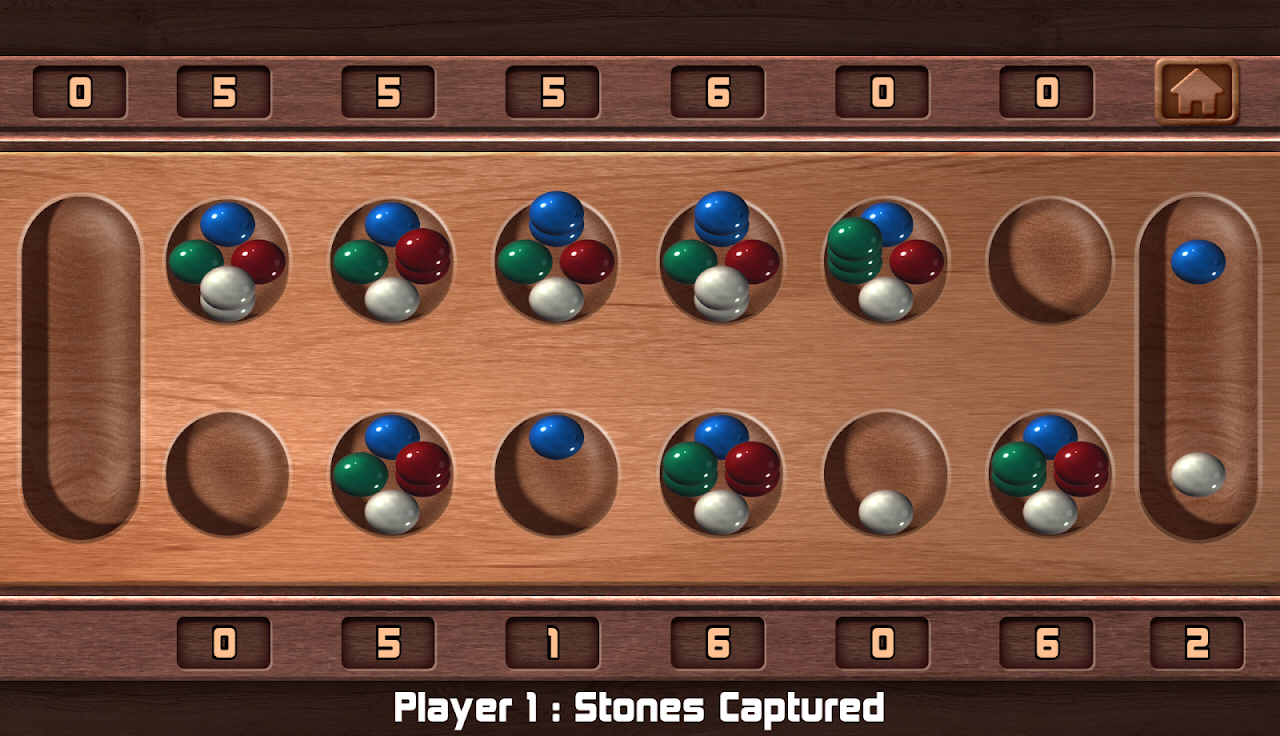Haolingxiazai provides the latest software downloads for Mancala games.


Mancala
| App Name | Mancala |
|---|---|
| Genre | Board |
| Size | 16.5 MB |
| Latest Version | 4.4 |
| MOD Info | Premium Unlocked |
| Get it On |

|
HOW TO PLAY THE MANCALA FREE APP?
GAME SET-UP:
The board has two rows, six pits (round holes) each with a store (oblong hole) at each end. Four marbles are placed in each hole.
MANCALA GAMEPLAY:
Each player starts their turn by selecting a hole on their side. The player drops a marble, one-by-one, into each succeeding hole counter-clockwise around the board until the marbles run out. In Mancala, this is called "sowing."
CAPTURE: If you end on an empty pit in your row, the marbles in the opposite pit are captured.
FREE TURNS: Place your LAST MARBLE in your store and get an extra turn!
AND THE WINNER IS...
When a player runs out of marbles, the game ends. The opponent gets to add all marbles on their side of the board to their store. This is where real strategy comes into play.
The player with the most marbles in their store wins!
MANCALA FREE STRATEGY TIPS
- Plan ahead, get free turns whenever possible.
- Going first? Start with the hole that is FOUR PITS away from your store. Why? Because the last marble you place will end in your store and you get a BONUS turn!
Ready to travel back in time? Mancala isn't exactly a time machine, but it's one of civilization's earliest games.
Mancala is an ancient strategy board game that has been played for centuries across various cultures. It is a simple yet captivating game that combines elements of strategy, skill, and luck.
Objective:
The goal of Mancala is to capture more stones than your opponent by moving stones strategically around the board.
Gameplay:
Mancala is played on a board with two rows of six pits, known as "houses." Each house initially contains four stones. Players also have a large pit called the "mancala" on their side of the board.
The game begins with one player taking all the stones from any of their houses and distributing them counterclockwise, one stone at a time, into the subsequent houses. If the last stone lands in a house containing other stones, the player continues to distribute stones from that house.
If the last stone lands in the player's mancala, they get an extra turn. However, if the last stone lands in an empty house on the opponent's side, the player captures all the stones from the opposite house and places them in their mancala.
Capture Rules:
Capturing stones is a crucial aspect of Mancala. When a player's last stone lands in an empty house on the opponent's side, they capture all the stones from the opposite house. However, if the opposite house is also empty, no stones are captured.
Winning:
The game ends when all the stones have been captured by one player. The player with the most stones in their mancala wins.
Strategy:
Mancala requires a combination of strategy and foresight. Players must carefully consider the distribution of stones to maximize their captures and prevent their opponent from capturing their own stones. Blocking the opponent's potential moves and forcing them into disadvantageous positions are key strategies.
Variations:
Over the centuries, numerous variations of Mancala have emerged with different board sizes, starting stone counts, and capture rules. Some popular variations include:
* Kalah: A two-player version with a 6x6 board.
* Bao: A complex African variation with a 8x8 board and intricate capture rules.
* Oware: A Ghanaian variation with a 6x8 board and unique "stealing" rules.
Cultural Significance:
Mancala has been played for generations in various cultures worldwide. It has served as a source of entertainment, a tool for teaching strategy, and a way to connect with history and tradition.
Conclusion:
Mancala is a timeless strategy game that continues to captivate players of all ages. Its simple rules, engaging gameplay, and strategic depth make it a game that can be enjoyed by anyone. Whether played for fun or competition, Mancala remains a classic that has stood the test of time.











